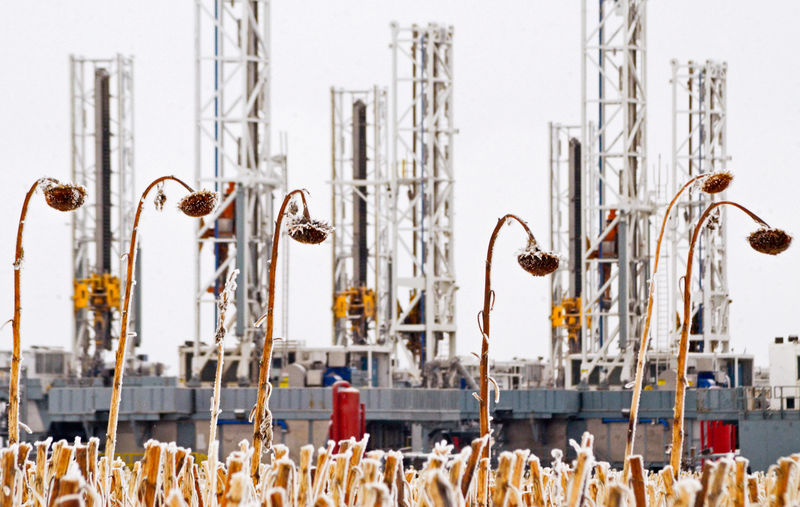By Ernest Scheyder
VIENNA (Reuters) - U.S. shale oil producers and OPEC appear to have called a truce of sorts even though there is no sign the U.S. industry will do anything to help reduce the global oil supply glut.
U.S. producers applauded Thursday's decision by the Organization of the Petroleum Exporting Countries (OPEC) and non-OPEC producers led by Russia to extend output cuts until the end of 2018.
Texas and North Dakota - the two largest U.S. shale-producing states - described it as a boon for their producers. Their appreciation was in contrast to a more combative style in recent years, when shale states seemed to relish openly bashing the group.
"Now that it seems prices are looking to stabilise with this OPEC deal around $60 (per barrel), I think that's going to be a very nice price environment for folks around the state," Ryan Sitton, one of three commissioners on the Texas Railroad Commission, said in a phone interview from Austin.
The commission regulates the Texas oil industry, which pumps over 3 million barrels per day, more than some OPEC members. Sitton forecast output would grow by an additional 2 million barrels per day within a decade.
Unlike the last OPEC meeting in May, when frustration with shale producers boiled over into public view more than once, members in Vienna this week took a more conciliatory tone.
"Shale is an important parameter, and complementing to the production of the world," United Arab Emirates Energy Minister Suhail al-Mazroui told reporters on the sidelines of the talks.
"We cannot ignore it, but we need to apply the right weight for that contributor without exaggerating the effect if it."
Tommy Nusz, chief executive of North Dakota shale producer Oasis Petroleum Inc, told Reuters OPEC members "have demonstrated that they have a difficult time understanding the U.S. shale plays, but I suspect that is improving."
One reason for the change in OPEC's tone may be a greater confidence that U.S. shale producers will never be able to match its clout especially with the global appetite currently growing by some 1.5 million barrels per day (bpd).
OPEC supplies roughly a third of the world's crude. U.S. antitrust law prevents U.S. producers from joining the group.
"There was a lot of fear-mongering about shale before 2017. The contribution by shale in 2017 (to global oil supply) will be manageable and quite moderate" and should be the same in 2018, Saudi Energy Minister Khalid al-Falih said in Vienna.
Some members noted that optimistic output forecasts have rarely been met.
U.S. shale production had been expected to grow roughly 1 million barrels per day last year, but managed only to rise by about half that, Kuwaiti Oil Minister Essam al-Marzouq said.
"They have a limited quantity that they can grow in," he said.
PRODUCTION LEAPS
Even data from the U.S. Energy Information Administration on Thursday showing oil production rose 3 percent in September to nearly 9.5 million bpd, for a rise of more than 25 percent so far this year, failed to dampen the mood.
The jump surprised markets and highlighted how quickly shale producers have responded to rising prices with higher production, following a pattern that has dogged the oil industry throughout its history.
Nearly all of the increases in U.S. oil production in recent years have come from shale, which in total accounts for nearly two-thirds of the nation's existing output.
Scott Sheffield, executive chairman of Pioneer Natural Resources Co, one of the largest producers in the Permian Basin of Texas and New Mexico, the largest U.S. oilfield, said extra cash from higher prices should go to shareholders, not fresh drilling.
"If producers in the U.S. increase their rig count over the next few months due to higher prices then I expect another price collapse by the end of 2018," he said.
"I hope that all U.S. shale companies will maintain their current rig counts and use all excess cash flow to increase dividends back to their shareholders," he said.
Ann-Louise Hittle, an oil market analyst for Wood Mackenzie who attended the Vienna meeting, said Sheffield was trying to send a clear signal to the industry.
"He's emphasizing value over volume, which is reassuring and shows that he's trying to influence other shale producers," she said.
Nigerian Oil Minister Emmanuel Ibe Kachikwu said he's far more worried about his costs than U.S. shale producers, and has been pushing Halliburton (NYSE:HAL) Co, Schlumberger NV (NYSE:SLB) and other service providers not to hike their rates.
"Those guys (shale producers) will be emboldened by any deal we make," he said. "I worry less about shale than my costs."

If the shale industry focuses more on profits, it could help its members thrive for the long term in the relationship with OPEC, analysts have told Reuters.